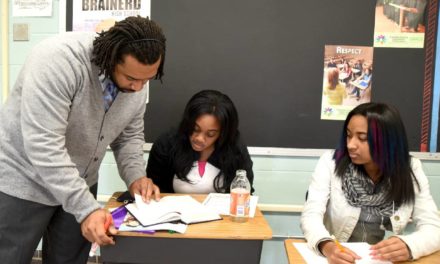Success Planning – Beginning with the End in Mind
Your first teaching job could very well be the start of a long, accomplished career in education.
How do you spell S-U-C-C-E-S-S?
Do you remember the old commercial that advertised Rolaids, an over-the-counter indigestion relief medicine? It asked, “How do you spell relief? R-O-L-A-I-D-S! In the same context, how do you spell success? The way in which you define success will largely determine whether or not you achieve it. Success is ultimately determined by the achievement of tangible results or goals. Thus, I define success planning as “new teachers strategically thinking of intentional things they will do to help ensure a successful career in education.”
Begin With the End in Mind
How can new teachers start positioning themselves for a long and successful career in K-12 education? Stephen Covey, author of Seven Habits of Highly Effective People stated that highly effective people begin with the end in mind. Landing your first job as a teacher is not nearly as important as experiencing a long and successful career in education. Your first year of teaching will be enamored with getting to know your students, learning the curriculum and standards, new teaching pedagogy, familiarizing yourself with the school culture, building rapport with parents and colleagues, settling into your new assignment or grade level, and much more. Still, your first year will past quickly so volunteering at family events and on school committees will put you in a better position to land a leadership role down the line.
Proper Preparation Precedes Progress
Someone said, “If you fail to plan, you are planning to fail.” As you think about your career, it is important to create a personal vision and mission statement for yourself. List your desired outcomes for your career and answer these questions: Why did you enter education? What is your purpose for teaching? What positon do you see yourself doing ten years from now? What level of education and experiences will you need? What are your strengths? What are your areas of weakness or need for development? What professional development or coaching will you need? Do you prefer teaching younger or older students? Are your strengths more suited to be an administrator, teacher leader or curriculum coordinator? Give all of these questions careful consideration in order to move from abstract thinking to what actually needs to be done to achieve your vision for a successful career.
Reflection, Reflection, Reflection
While relaxing on summer break is important, it is significant that teachers reflect on what they’ve experienced and prepare to do things better with the next class. Begin by asking yourself, “What things went well this year and what can I do to be a better teacher next year?”
In my educational career of over 30 years, I’ve learned that if it wasn’t written down, it didn’t happen. Although reflection is essential, it is equally important to formerly keep a daily journal to reflect on your thoughts, ideas, goals, successes, failures, plans to do differently, interactions with others, parent contacts, etc. Finally, as you reflect, find another person to hold you accountable for fulfilling what you said you would do. Your critical friend can be a colleague, friend, or family member who you will consistently communicate with at least weekly to discuss what you’ve reflected and accomplished. Your critical friend must be willing and able to be blatantly honest with you concerning your goals, progress, or lack thereof.
AUTHOR: Dr. Anthony L. Moore is an Assistant Superintendent with the Raytown Quality Schools in Kansas City, MO. He has nearly 30 years of experience in urban education as a teacher, administrator and university professor. Dr. Moore has served as chief diversity officer, educational consultant, author and certified diversity trainer and leadership coach. He can be reached at moorea@raytownschools.org.




